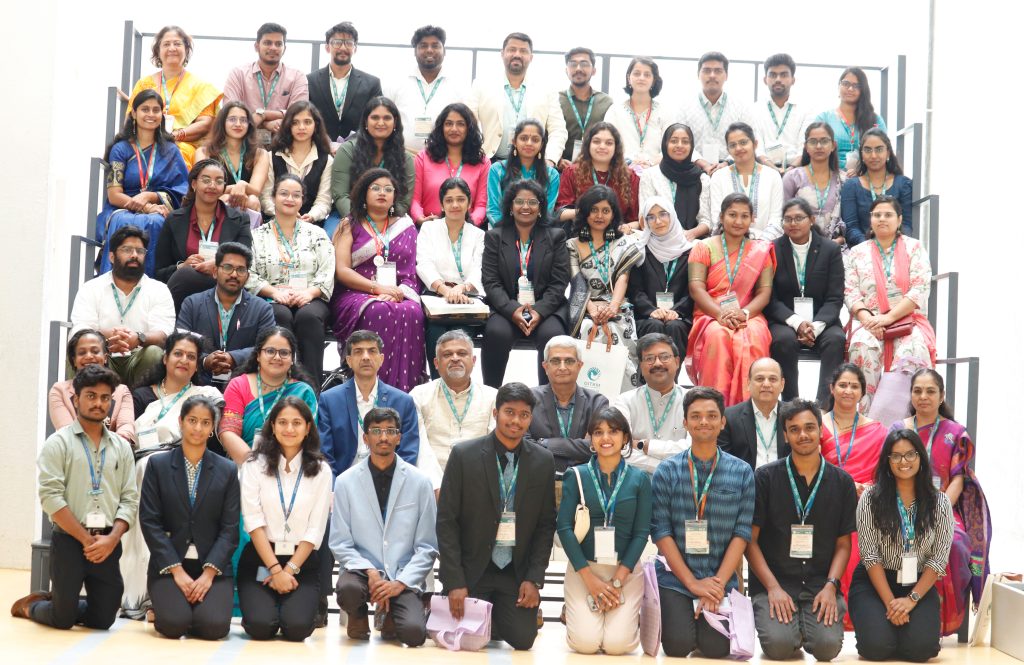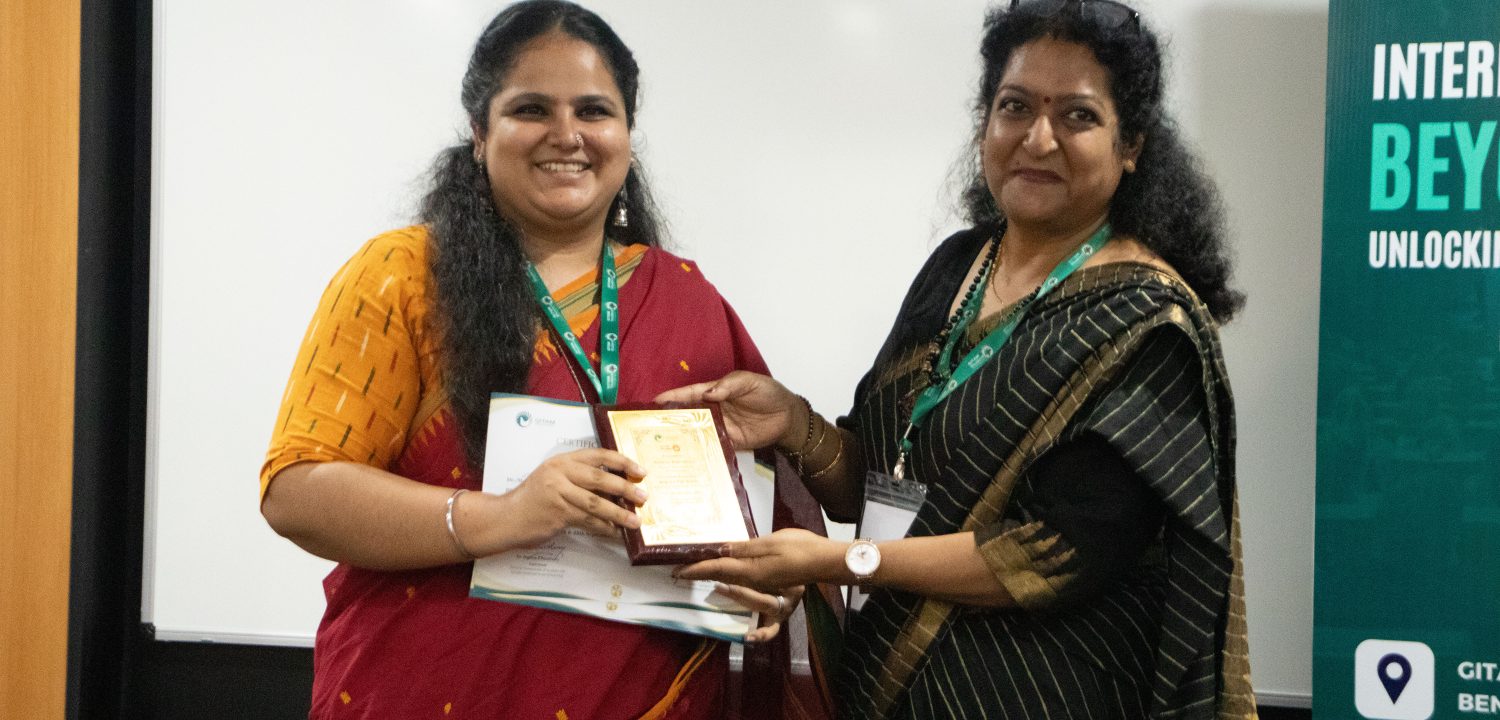A research paper to address the mental health challenges of students

The International Symposium on Student Life took place at GITAM University, Bengaluru, between 27-28 September, 2024. The symposium’s theme, Beyond the Books: Unlocking the Full Potential of Student Life, focused on key aspects such as Transforming Student Experiences, Shaping Student Leaders, Building Communities, Empowering Voices and Technology in Student Life.
A collaborative delegation from Krea University and the Schizophrenia Research Foundation (SCARF) presented their research at the symposium. The delegation comprised Amanjit Kaur Ahuja, Director of Student Services, Krea University; Aparna Raghhavan, in-house counselor, Krea University; Diya Ahuja, Alum, Cohort of 2024, SIAS and Dr Shiva Prakash Srinivasan.
Their research paper, titled Maximizing Their Potential: Providing Reasonable Accommodations for Students with Mental Health Challenges in Institutions of Higher Education: A Krea University Experience, outlined a proposed policy framework to assist higher education administrators, educators and mental health professionals in developing guidelines for reasonable accommodations for students facing mental health challenges in India. Aligned with existing Indian legislation, UGC regulations and the social model of disability, their work offers disorder-specific guidelines to support students with mental health challenges. In light of the diversity of higher education institutions in India and the varied manifestations of mental health conditions, the paper proposed a principles-oriented framework to navigate the challenges in providing appropriate accommodations. The paper was well-received at the symposium.
In addition to the research presentation, Amanjit Kaur Ahuja was invited to chair a paper presentation panel titled Balancing Act: Strategies for Student Well-being and Academic Success. She was also invited to participate as a panelist in the Global Perspectives on Student Life: Innovations & Best Practices roundtable discussion. This discussion featured faculty and administrators from various universities in India and abroad, focusing on effective strategies and transformative initiatives to promote a sense of belonging and strengthen student affairs practices across institutions globally.
Abstract:
Disability legislation in India and University Grants Commission (UGC) guidelines stipulate clear directives on addressing the needs of students with physical and learning disabilities. However, a discourse on how to provide academic and other forms of accommodations to students with mental illness is lacking despite it being recogniSed as a disability under the law.
Our paper recommends a policy directive for implementing mental health accommodations in higher education institutions. We draw on our experience at Krea University where the (ILS) Office of Inclusive Learning Support has instituted a robust, acceptable, multi-component, responsive mental health accommodations system in collaboration with SCARF, a reputed Mental Health Institution, over the last 5 years. The proposed policy framework will equip higher education administrators, educators and mental health professionals to formulate specific guidelines outlining reasonable accommodations for students facing mental health challenges in their respective institutions.
This is vital to maximising the full potential of student life, especially given the evidence of a mental health crisis amongst young people in India. Our work outlines disorder-specific guidelines for supporting students with mental health challenges in higher education institutions. Given the unequal access, and diversity of higher education institutions in India and the myriad manifestations of mental illnesses, we propose a principle-oriented framework for navigating the different challenges that will inevitably arise in this context. These principles form our core philosophy and are in line with the existing legislation and the social model of disability. We close our paper with future research directions to evaluate such interventions’ outcomes.
Examples of Accommodation
• Flexible deadlines and alternative assessment methods: For students with time-management difficulties due to mental health or learning disabilities, offering flexible deadlines or alternative assessments, such as oral exams or project-based evaluations, provides an accessible route to demonstrate knowledge.
• Assistive technology integration: Tools such as screen readers, note-taking software and audio lectures assist students with visual, auditory, or processing challenges, allowing them to engage with course material effectively.
• Quiet study spaces and extended exam time: Creating designated areas for focused study and extending exam time helps reduce anxiety and allows students to perform to their full potential without time pressure.
• Routine check-ins: Implementing regular check-ins with in-house counsellor or academic mentors supports students’ ongoing progress and adjusts accommodations as needed throughout the academic year.
Principles
Based on the existing spirit of legislation and using UGC guidelines as a signpost, the team has come up with the following principles (in no particular order of importance) that must guide mental health accommodations in post secondary academic institutions.
• Principle of pedagogical integrity: Although certain aspects of pedagogy can and should be adjustable to meet the accommodation requirements of students, there are certain components of pedagogy which may vary from course to course, such as group discussion or presentation which are indispensable to learning that course. Accommodations should take care to preserve those aspects of pedagogy as best they can for two reasons. One, without covering that component, the student cannot be said to fulfil learning outcomes. Two, it would not create a level playing field for other students.
• Principle of transparency: This is a principle that has already been implemented with regards to the general policies of a college or most organisations. Extending it to mental health, all universities must have a full and transparent document easily and publicly accessible on their website detailing the exact policies on accommodations, including but not limited to documentation required, policy on information sharing with parents, data protection policies, which aspects of pedagogy are crucial for each course and so on. This is to ensure the student can make an informed decision before joining the university and can choose the best option for them.
• Principle of resilience: One of the aims of the University is to make students more resilient and prepare them for future work life outside the University. While there is no maximum limit on accommodation, the goal should be to use it as a temporary extra support to help students overcome their current mental health challenges. There should be periodic reviews keeping in mind all relevant stakeholders, such as the student, the college, medical professionals and the student’s self identified point of contact (if a major) or guardian (if a minor) to ensure that the student feels supported and that the correct help is provided.
• Principle of professional support: Along with other individual and institutional accommodations extended, universities must provide access to professional support to their students, ideally free of cost, or if not feasible at a minimum charge. Professional expertise should be sought in formulating the mental health policy of each University as well as in case accommodations. This is one of the most critical and necessary principles. Accessible professional support needs to be made mandatory in all institutions, as all the initiatives and interventions should be guided and assessed by the mental health professionals only.
• Principle of dynamism: Formulating a static ‘one size fits all’ policy for mental health accommodations in such a diverse country with mental health conditions manifesting in a varied pattern is difficult. The policy will need to be revised as required based on a formal feedback system. These accommodations should evolve with the rapidly changing and evolving learning needs of students. Similarly, as the COVID-19 pandemic has demonstrated, mental health accommodations would be different as classrooms and pedagogy evolve with environmental demands.
• Principle of a barrier-free environment: Every social, physical and learning environment presents certain barriers for persons with disabilities which limit their full participation and make aspects of their environment inaccessible to them. There should always be an attempt to identify such systemic barriers and remove them in order to enable the creation of inclusive conditions for everyone. For example, rigid deadlines and time-bound examinations are significant barriers for many students with disabilities. Attitudinal barriers also present a significant challenge which needs to be addressed continuously through sensitisation, knowledge sharing and building awareness.
Key Takeaways
• Importance of personalised academic support: Academic accommodations are tailored to meet individual needs, recognising the diversity in learning abilities and styles. Personalisation promotes a sense of belonging and encourages academic success for all students. It also encourages students to reach out for this kind of support.
• Equity over equality: The priority (according to our policy) is promoting equitable access and supporting/ensuring that students with diverse needs are also given a fair and equal chance to succeed in academics.
• Ongoing support and early intervention: The policy directive also touches upon proactive measures for providing end-to-end support from admissions until graduation that is provided by the ILS and the mental health services.
• Collaboration with faculty: The collaboration between teaching staff, psychiatric services and other support services enhances the effectiveness and the reach of these accommodations.
• Legal & ethical mandates: Understanding and incorporating legal and ethical mandates around the accommodations ensures the institutions in fulfilling their responsibility.
Keywords: Disability; Mental Illness; Multicomponent Interventions; Policy Directive; Principle Oriented Framework





